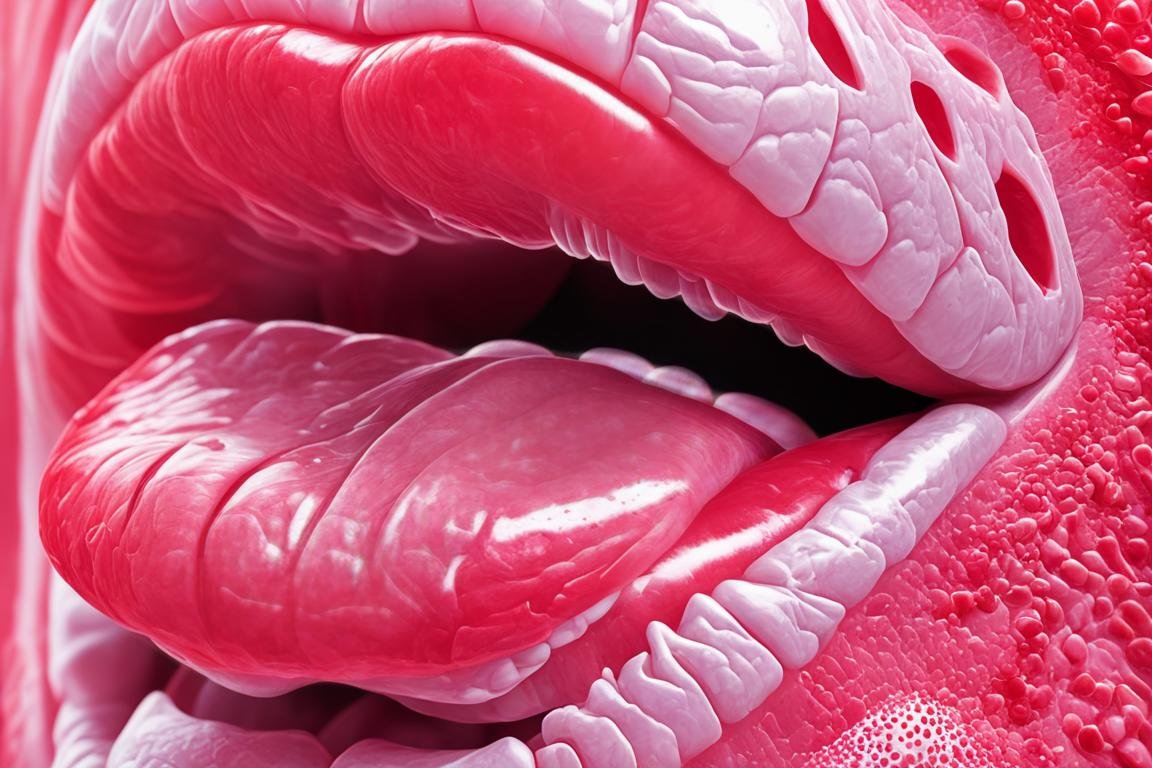Biting your tongue at night can hurt and cause problems. We’ll look at why this happens, like bruxism (grinding your teeth), facial muscle spasms, and more. It can come from illicit drug use and even Lyme disease. Chewing your tongue is bad and we’ll talk about how to stop it.
We’ll mention how it hurts your mouth and could mean you have a problem like TMJ. Using a mouth guard can help a lot. Also, not being too stressed and staying away from drugs might stop it. It’s important to see a doctor or dentist if it happens a lot. They can find out why it’s happening and help you fix it.
Key Takeaways
- Biting your tongue during sleep can be caused by various underlying conditions, including bruxism, sleep disorders, and neurological issues.
- Chronic tongue biting can lead to oral infections, dental damage, and temporomandibular joint (TMJ) problems if left untreated.
- Using custom-fitted or over-the-counter mouth guards can help protect your tongue from injury during sleep.
- Addressing stress and avoiding illicit drugs can also be effective in preventing tongue biting while sleeping.
- Seeking professional help from a dentist or sleep specialist is crucial to diagnose and treat the underlying cause of your tongue biting.
Understanding Tongue Biting While Asleep
Prevalence and Symptoms
Tongue biting at night is something many people go through. How often it happens isn’t clear. But, it’s common and affects a lot of folks. Signs that you may have bitten your tongue at night include bleeding or swelling. You might also feel pain, see cuts, have ulcers, or find your tongue’s edge looking different.
Risks and Potential Consequences
If you bite your tongue a lot at night, there could be big problems if you don’t stop it. You might get oral infections, have ulcers, or even hurt your teeth. Plus, you could have issues with your jaw, known as TMJ. In rare cases, not fixing your tongue biting habit can raise the chance of getting mouth cancer. So, stopping it is very important.
Causes of Biting Tongue While Sleeping
Biting your tongue at night can happen for many reasons. Each cause needs its own way to prevent and fix it. It’s key to know why to keep your tongue safe while you sleep.
Bruxism (Teeth Grinding)
Bruxism means grinding or clenching your teeth without meaning to. It can happen day or night, but night bruxism is when tongue biting is more likely. It’s often due to stress or anxiety.
Facial Muscle Spasms
Some people might bite their tongue by accident due to muscle spasms in their face or jaw. This can make their chin and jaw shake, causing tongue injuries. It’s mainly seen in kids.
Illicit Drug Use
Taking certain illegal drugs, like MDMA, can make you grind your teeth. This can then cause tongue biting. MDMA might make you want to bite things and relax your jaw, making it more harmful.
Lyme Disease
Lyme disease, spread by ticks, can affect how your body moves without you meaning to. This might lead to biting your tongue as you sleep. It also causes other issues like fatigue, sensitivity to light, and pain.
Nighttime Seizures
If someone has a seizure while asleep, their tongue might get between their teeth and be hurt. Seizures cause body movements you can’t control. This often injures the tip or sides of the tongue.
Rhythmic Movement Disorder
Some children repeat certain body movements while falling asleep or during sleep. This can include motion that makes them accidentally bite their tongue. It’s called rhythmic movement disorder.
Sleep Apnea
Even though sleep apnea mainly affects breathing, it can also lead to biting your tongue. This is because it might make your tongue fall back and get bitten.
Biting Your Tongue While Sleeping
Sleep Study and Diagnosis
Your doctor might suggest a sleep study to figure out why you bite your tongue when you sleep. You would spend a night or two at a sleep center. Experts would watch your brain, eyes, muscles, heart, and how you breathe.
The study would show if a certain issue like clenching your teeth, sleep troubles, or sudden intense movements is behind your tongue-biting. This way, you can get the right help.
Treatment for Underlying Conditions
The treatment plan for tongue biting will focus on the real problem. For bruxism, sleep apnea, or seizures, your goal is to handle these issues. That might mean using oral devices, machines to help you breathe at night, or taking medicines.
Fixing the main problem is key. It stops more tongue injuries and lets you sleep well.
Mouth Guards and Dental Protection
One good way to stop tongue injuries is using custom-fitted mouth guards at night. A dentist makes these custom mouth guards. They fit your mouth perfectly, protecting your teeth from grinding at night.
If you don’t need a special mouth guard, you can get over-the-counter mouth guards instead. They are cheaper and still help keep your teeth safe while you sleep. Just make sure it fits well and feels good in your mouth.
Stress Management and Lifestyle Changes
It’s key to tackle stress and anxiety for less sleep bruxism and tongue biting. Try relaxation techniques like deep breaths, meditation, or yoga every day. This lessens stress and stops unconscious tongue biting at night.
Relaxation Techniques
Using relaxation techniques can manage the stress causing tongue biting at night. Spend time daily on deep breaths, meditation, or simple yoga. This calms both mind and body, lowering the tongue biting prevention risk.
Avoiding Illicit Drugs
If tongue biting is due to illicit drugs like MDMA, stop using them. Quitting harmful drugs that lead to bruxism and tongue biting prevention is critical. This removes the dangerous habit and avoids more mouth harm.
Medications and Medical Treatments
Sometimes, medications are used to treat the causes of sleep tongue biting. For example, drugs for seizures can help with nighttime seizures. For sleep apnea, CPAP machines or surgery might be needed. It’s key to talk with your doctor to pick the right medical treatment.
| Condition | Medications/Treatments |
|---|---|
| Nighttime Seizures | Antiseizure medications |
| Sleep Apnea | CPAP machines, surgical interventions |
| Bruxism (Teeth Grinding) | Muscle relaxants, Botox injections |
| Lyme Disease | Antibiotics, anti-inflammatory medications |
Medications and medical treatments can help stop sleep tongue biting. They also prevent more harm to the tongue. It’s vital to team up with your doctor for a plan that fits your needs.
Preventing Tongue Injuries
To stop more tongue injuries from sleep bites, see a pro. This means talking to a dentist or a sleep expert. They’ll find out what’s causing the issue and make a good plan to treat it. Fixing the real problem helps you sleep well and keeps your tongue safe.
Seeking Professional Help
Get help from a health expert to figure out what’s making you bite your tongue at night. It could be things like grinding your teeth, not breathing well during sleep, or brain issues. They will offer the right treatments to stop you from getting more hurt.
Monitoring and Addressing Underlying Causes
Keeping an eye on and dealing with why you bite your tongue as you sleep is really important. You’ll need to see the health expert often, maybe change treatments, and fix parts of your life to lower stress. Avoiding drugs and having good sleep habits are key. Being careful and doing what you need to fix this issue keeps you from a sore mouth.
Getting help and really working on why you bite your tongue at night stops more injuries. It helps you sleep well and feel good. Remember, taking care of your tongue is very important. So, act now and make sure it stays safe.
Children and Tongue Biting While Sleeping
Biting the tongue at night happens a lot in kids. It can happen because they move their body a lot while they sleep. This might include rocking or hitting their head. It’s called rhythmic movement disorder. Many kids get over this when they get older. But, it’s good to watch for any tongue cuts or bites.
Rhythmic Movement Disorder in Children
Kids mostly get rhythmic movement disorder. This can lead to biting the tongue during sleep. About half of all children have grinded their teeth in their sleep. This goes down as they get older. Children often have muscle twitches in their face and jaw that cause them to bite their tongue.
Monitoring and Treating Sleep Disturbances
If your child bites their tongue during sleep, watch their sleep habits. Try to see if there’s a bigger sleep problem. It’s great to work with a doctor who knows about kids and sleep. They can check if there’s something like sleep apnea or seizures. The right help can stop more tongue injuries and help your child sleep better.
Complications and Risks of Chronic Tongue Biting
Biting your tongue a lot can cause many problems, like mouth infections and ulcers. When your tongue gets hurt over and over, it opens the door for germs. This brings swelling and infection. And, it makes painful ulcers that could get worse if you keep biting.
Oral Infections and Ulcers
Chronic tongue biting is serious and can cause infections and ulcers. These sores let in germs, which can lead to big infections. Biting can make these already sore spots hurt more, and it causes more irritation.
Dental Damage and TMJ Issues
Biting your tongue while sleeping can hurt your teeth and jaw. It’s because strong tooth grinding can break or wear down teeth. This bad habit can also stress your jaw, making it hurt, click, or hard to move. This makes tongue biting problems even worse.
Finding why you bite your tongue is key to stopping these issues. It could be from a sleep problem, a nerve issue, or just grinding your teeth. Working with a doctor can help make a plan to take care of your mouth. This way, you protect your tongue and keep your teeth and jaw healthy.
Biting Tongue While Sleeping
Biting your tongue while sleeping is more common than you might think. It can happen due to many reasons like bruxism, twitching face muscles, or even illicit drug use.
If you have nighttime seizures or sleep apnea, you might bite your tongue more often. The exact number of people who bite their tongues at night is unknown. But, most experts believe everyone does it at least once.
You might notice some signs if you’ve been biting your tongue at night. These can be bleeding, redness, or a swollen tongue. Also, you may feel pain, see cuts or ulcers, and notice wavy edges on it.
Conclusion
Biting your tongue while sleeping can be really painful. It can also mess up your sleep. But, there are ways to stop this from happening. First, find out why it’s happening. It could be because of bruxism, some sleep issues, or a health problem. Then, it’s important to seek professional help to figure out the best treatment. This way, you can avoid hurting your tongue and sleep better.
Dealing with what’s making you bite your tongue at night is the main step. This might mean getting help for a sleep problem or bruxism. Or it could be treating a health condition. Working with your doctor or dentist is key. They can help you find the best ways to sleep well without hurting your tongue.
You don’t have to put up with tongue biting hurting you. Getting the right help and treatment can make it stop. So, don’t wait to seek professional help. They’ll help you safely and effectively. Then, you can sleep better and feel better, too.




